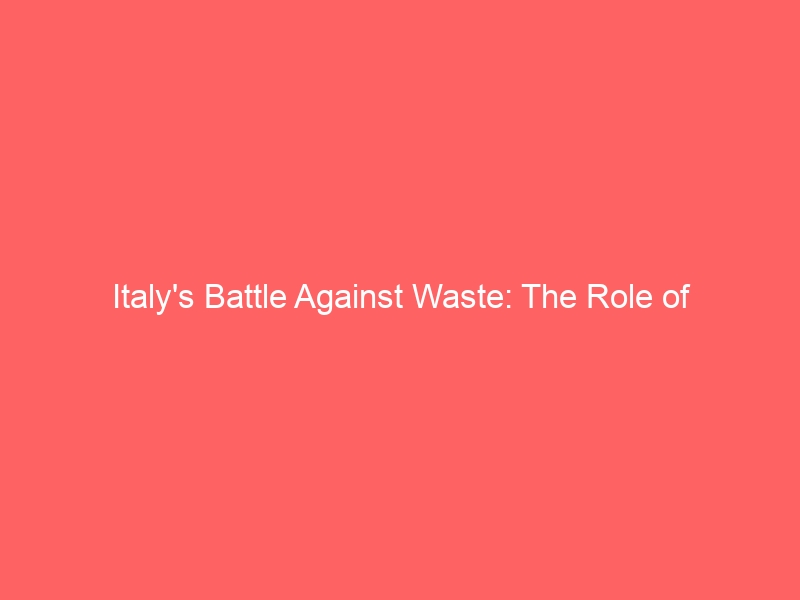Italy’s Battle Against Waste: The Role of Incinerators in the Country’s Waste Management
Italy has long struggled with waste management issues, and the country has been making significant efforts to address the problem in recent years. One crucial aspect of Italy’s waste management strategy is the use of incinerators to reduce the volume of waste and generate energy. Incinerators have been a contentious issue in Italy, with questions about their environmental impact and public health concerns. However, supporters argue that incinerators are a crucial tool in Italy’s battle against waste and can play a vital role in the country’s waste management system.
The problem of waste management in Italy has been a significant issue for decades. The country has faced challenges related to waste disposal, illegal dumping, and the overuse of landfills. In the past, Italy relied heavily on landfills as the primary method of waste disposal, leading to environmental degradation and health issues for nearby communities. In response to these challenges, the Italian government has implemented several initiatives to improve waste management practices and reduce the amount of waste sent to landfills.
One of the key components of Italy’s waste management strategy is the use of incineration. Incinerators are facilities that burn waste at high temperatures to reduce its volume and generate energy. The process of incineration can significantly decrease the amount of waste that ends up in landfills, which in turn helps to alleviate the burden on these disposal sites. Incineration also produces energy in the form of heat and electricity, which can be used to power homes and businesses.
The use of incinerators in Italy has been met with both support and opposition. Supporters argue that incinerators are an essential tool in the country’s efforts to manage waste and reduce environmental impact. They point to the fact that incineration significantly reduces the volume of waste, minimizes the need for landfills, and generates energy. Additionally, incineration can be a cost-effective method of waste management, as it can produce electricity that can be sold to the grid.
Opponents of incineration in Italy raise concerns about the environmental and health impact of incinerators. They argue that the process of burning waste releases pollutants and greenhouse gases into the atmosphere, contributing to air pollution and climate change. Additionally, the emissions from incinerators can contain toxic substances that pose health risks to nearby communities. Critics also point out that incineration can discourage efforts to reduce, reuse, and recycle waste, as it provides a convenient method of disposal for materials that could be repurposed or recycled.
In response to these concerns, the Italian government has implemented strict regulations and standards for incinerators to ensure that they operate in an environmentally responsible manner. Incinerators in Italy are required to meet stringent emissions standards and control measures to minimize air pollution and protect public health. The government also encourages the use of advanced technologies and best practices to maximize energy recovery and minimize the environmental impact of incineration.
The role of incinerators in Italy’s waste management strategy is a complex and multifaceted issue that requires careful consideration of environmental, social, and economic factors. While incinerators can play a crucial role in reducing the volume of waste and generating energy, it is essential to mitigate their potential environmental and health impacts. Italy’s approach to waste management must balance the need for effective waste disposal with the preservation of environmental quality and public health.
FAQs
Q: Are incinerators in Italy harmful to the environment?
A: Incinerators in Italy are required to meet strict emissions standards and control measures to minimize their environmental impact. While the process of incineration can release pollutants into the atmosphere, modern incinerators are equipped with advanced technologies to reduce emissions and protect the environment.
Q: Do incinerators in Italy pose a risk to public health?
A: The Italian government regulates incinerators to ensure that they operate in a manner that protects public health. Incinerators are required to comply with strict emissions standards and control measures to minimize the release of pollutants that could pose health risks to nearby communities.
Q: What is the role of incinerators in Italy’s waste management strategy?
A: Incinerators play a crucial role in reducing the volume of waste and generating energy in Italy’s waste management system. They help to alleviate the burden on landfills and provide a method of waste disposal that can be cost-effective and sustainable.
Q: How does Italy regulate the operation of incinerators?
A: The Italian government enforces strict regulations and standards for incinerators to ensure that they operate in an environmentally responsible manner. Incinerators are required to meet emissions standards and control measures to minimize air pollution and protect public health.
Italy’s Battle Against Waste: The Role of Incinerators in the Country’s Waste Management




